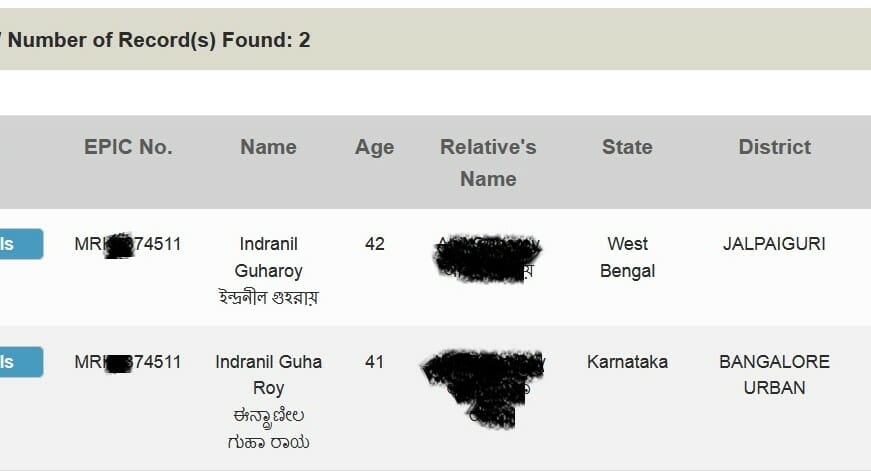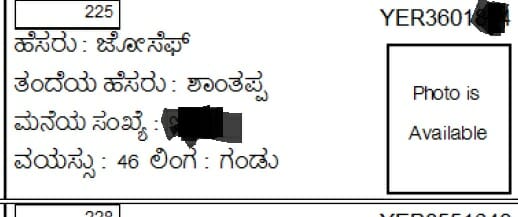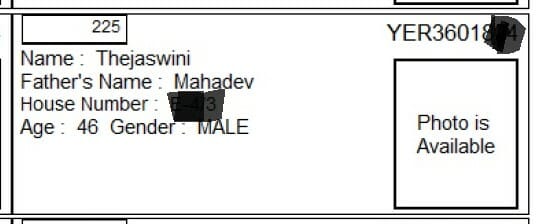Final voter lists have been released for Shivajinagar, Mahadevapura and Chickpet, the assembly constituencies at the heart of the illegal voter data collection issue in Bengaluru. With this, electoral rolls have been completed for all 28 assembly constituencies in the city, based on the special summary revision organised by the State Election Commission between November 9th and December 8th in 2022.
The lists for Bengaluru were finalised by the BBMP revenue department, the agency in charge of handling election logistics within city limits.
With the illegal voter data cloud still looming over election agencies, officials promised to put their best foot forward while finalising voter rolls. Indeed, BBMP Chief commissioner Tushar Giri Nath appeared to have conducted door to door verification himself in some parts of the city. However, one citizen activist has pointed out that the final lists are not error free.
History of errors
The final lists show over 90 lakh voters in the city; nine lakh voters were confirmed from the lists prepared in Shivajinagar, Mahadevapura and Chickpet and the remaining 25 constituencies saw 82.3 lakh voters. Over one lakh voters were added to the rolls and over two lakh voters were deleted because of duplications, death or inability of the election officials to find them. Over 40,000 first time voters have been added to the rolls.
In Shivajinagar, Mahadevapura and Chickpet, where the BBMP extended its review, 13,000 more voters were added compared to the draft voter rolls published in November 2022. The total number of voters in the three constituencies has reduced by 17,000 compared to last year.
These numbers do impress Commander PG Bhat, a software engineer and voter reforms activist, who has repeatedly pointed out that the voter lists in the city are bloated with several duplicate entries. For a few years now, Bhat has used his own software to go through the publicly available voter lists and find errors.
Read more: Illegal voter data collection: Does it really matter?
The activist said that in January 2021, he had informed the current Chief Election Officer (CEO) of Karnataka, then special commissioner for BBMP, of lakhs of duplicated entries in the voter lists. The activist also documents these findings on a blog he maintains.
In a blog post, two years ago, Bhat reported that as of January 2021, at least 14,254 voter ID numbers were repeated and over three and a half lakh voter details were duplicated within the same house, same election part or polling booth, or the assembly constituency. These are just the number of voter names that have been duplicated and not the number of times each name has been duplicated; this means over three lakh names on the list have been duplicated at least once, but they may well have been duplicated several times.
As an example, Bhat documented two instances where a single person, with the same name, father’s name and house number had six different voter ID numbers assigned to him. I could not find two of these duplicate entries highlighted in his blog from 2021, in the updated list suggesting these were rectified.
However, I found one continued to exist–one voter appeared to be registered to vote both in West Bengal and in Dasarahalli in Bengaluru North.

Errors continue in revised rolls
However, two years on, the situation remains dire according to the activist. As recently as November last year, during the height of the Chilume scam, Bhat identified several errors in the electoral rolls and presented a sample in his blog.
Among these are seven voters with the same name, relative’s name, house number but different voter ID numbers, who appear twice in the voter rolls of a single electoral part or polling booth and assembly constituency. These voters are from the Yeshwantpur, Bommanahalli, BTM Layout, and Hebbal constituency.




I checked both the National Voters Survey Portal (NVSP) and the freshly updated voter rolls up on the CEO-Karnataka’s website and found at least six of these duplicate entries still exist. Moreover, I manually found duplicate entries for two voters Part 314 of Rajarajeshwari Nagar constituency. Both voters had two voter id numbers registered in their name.
Meaning, over the course of a long election day, one person with potentially two voter ID numbers can vote twice in the same election.
Bhat also highlighted one case of the Kannada and English versions of the voter lists having completely different voters under the same voter ID number in the same part of a Bengaluru Urban assembly constituency.
The Kannada version shows a male voter called Joseph while the English version shows a male voter called Thejaswini, both with the same voter ID numbers but different relative names and addresses. These errors have made it to the latest Kannada and English lists published on January 5th. Come polling day, one of these voters might not be able to exercise their fundamental right.


Bhat believes that most of these errors can be corrected if the Election Commission (EC) simply rectified their software. “I have made presentation after presentation demonstrating that ERO-net is not effective in catching duplications,” he says. “If a single person like me can find so many errors, why is the EC with all its resources and huge tech team not able to fix these lists?”
The curious case of Mooga
The voter registration system itself may be leading to some confusion and potential mismanagement on polling day. In his February 2021 blogpost, Bhat also highlighted two male voters named Mooga, with relative name also written as Mooga, listed from Rajarajeshwari Nagar, part 239. Both Moogas were of different ages and had different voter ID numbers. Both had similar but not identical door numbers–one Mooga was listed at door number 68 and the other at number 68 Nirashrithara.
Bhat pointed out that he found the listing curious not just because of the same names (of voters and listed relatives) and similar addresses, but the meaning of the names. In Kannada, mooga means mute.
On checking the updated voter list from part 239 of this constituency, I found 380 voters at this address. No. 68, Nirashrithara Parihara Kendra, located on Magadi Road, is one of many state run homes for the homeless. At least ten of its residents are simply registered as Mooga (relative name also Mooga). Each of these voters are also listed on NVSP.




One female resident also appears to be on the voter list, registered as Moogi (relative name also Moogi), which in Kannada translates to feminine gender of mute. However, the NVSP shows a woman by the name Jayalakshmamma, (wife of Yallappa) under the same voter ID number. There is also a voter called Dumb (relative name also Dumb) at No 68, Nirashrithara and is listed under the same name on NVSP.
Read more: Illegal voter data collection: How can we protect our privacy?
Staff at No 68 Nirashrithara Parihara Kendra, who did not wish to provide their names, confirmed that BBMP officials had come for voter verification in December. They explained that several residents at the centre were mute or unwilling to speak, had no paperwork on them, and usually refused to provide any details. If they didn’t speak they were simply registered as Mooga. “We take them to the pooling booth during election and they are free to do what they want,” one staff member said.
The staff was unable to confirm that the female voter registered by BBMP as Moogi was the same woman registered as Jayalakshmamma on NVSP or a completely different individual.
I have been unable to contact the BBMP commissioner Tushar Giri Nath. Calls to Special Commissioner Ujjwal Kumar Ghosh and Joint CEO Ramesh K.N. have also not been received. This story will be updated if they respond.
Meanwhile, Bhat is frustrated but not surprised. Over the years, he has presented his findings to multiple election officials as well as MLAs and MPs from BJP, Congress, JDS, and AAP.
“Nobody is interested in fixing these problems,” he says. “So, now I have almost given up and started focusing on other work.”